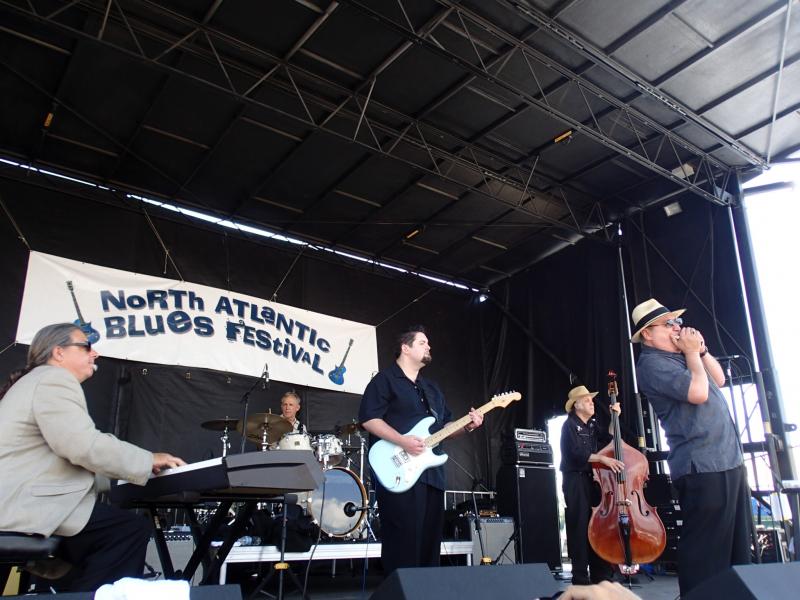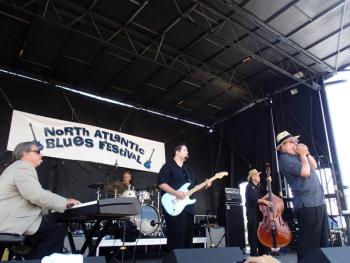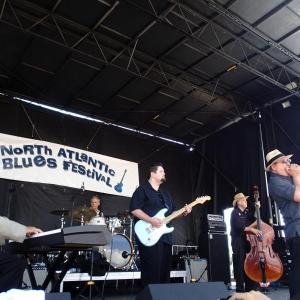Barrett Limoges: Blue Sunday in Rockland
ROCKLAND — The sun’s yellow orb climbs towering into the sky, beating down ruthlessly on the ocean of spectators amassed in Rockland’s Harbor Park for the 20th annual North Atlantic Blues Festival. A thunderous night of pub crawling and a thermometer reading that has reached into the 80s well before noon has resulted in an unmistakeably more subdued atmosphere than Saturday, yet much like the helio guardian that unmercifully seeks out every sweating pore and sunburned head in the crowd below, spirits remain unshakably elevated.
Perhaps heat is the natural accompaniment for a form of musical expression that is planted in the heart of the American south and at the root of virtually every form of modern popular music. There is an unmistakable recognition in the blues — a universal intuition, that people like Ruth Atherington have tapped into for the purpose of music therapy.
Her organization, “Raising the Blues,” is the official charitable partner of the festival. Bringing historical and musical education to children with special and medical needs, she knows better than most the transcendent power of this old art form.
“It’s intuitive in the rock music or other music they listen to,” she says. “They may have never made the connection, but once they hear it, those progressions are incredibly intuitive. They feel it coming, they feel the turning of the twelve bar blues, and they are able to react to it.”
Across the nation though, many in the younger generation have been slow to take up the music that influenced an entire generation of older guitar players. Despite the success of events such as this festival, blues has shrunken to a relic of its former commercial dominance. The music industry garners now less than one percent of its profits from sales within the genre and the crowd here unmistakably skews older. Blues, it seems, may be going through some ‘hard times’ of its own.
Whatever its difficulty catching on with a younger audience, you wouldn’t know it from the festival’s performers. Leaning against the railing backstage overlooking the harbor, Sunday’s acoustic opener Matt Andersen, 32, is one of many young blues musicians that have risen to prominence through recent years — often helped along by performances in Rockland. Like many young performers, Andersen followed his path to the blues through the roots of the music he grew up listening too.
“I started off playing lots of classic rock, lots of folk and southern rock,” he says. “You listen to that stuff, and it’s pretty much all blues based.”
He says that what struck him most about the blues was its honesty.
That honesty has attracted a fierce and loyal following. Most people in the crowd have been coming to the festival for years, and have made a point of passing on the musical heritage to their children. Atherton, who never misses the event, used her passion for the music to help her own son overcome illness when he was younger.
“I actually made my son an alphabet book when he was about two,” says Atherton. “One page was a letter and the other page was a picture of and artist, like A is for Albert King, is for B.B. King, C is for Clapton, and so on,” she says. Laughing, she recalls one day being confronted by an amused day-care teacher, who asked why her son seemed to think the letter “H” was called “Hendrix”.
One member of the audience, Jim Demetropoulos, has been listening to the blues since the late 1950s. He turned to the genre as an energetic anecdote to his father’s opera music. Five decades and two blues festivals later, he still struggles to express exactly what makes the blues unique.
“Blues is hard to put into words,” he says. “I’ve talked to a lot of people who say ‘blues makes me sad.’ Well, blues doesn’t make me sad,” he laughs, “and I don’t think it will change too much, because if it did… well, it wouldn’t be blues.”
Barrett Limoges lives in Rockport.
Event Date
Address
United States

























